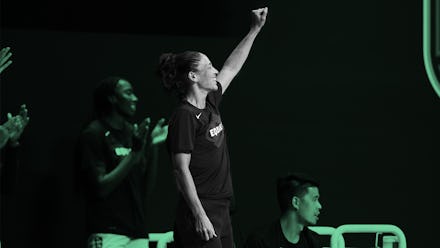How the WNBA has redefined itself as a champion of social justice

It's an undeniable fact that professional sports in the United States have served as a vehicle to push for much-needed changes within the fabric of the nation. It's also a fact that these changes have not always been welcomed — or worse, have been overlooked based on who's fighting for them.
When it comes to the Women’s National Basketball Association, championing societal change through sport — like addressing racism and police brutality or pushing for LGBTQ inclusivity — has always been integral to its legacy. And throughout a year that's been marked with a global pandemic, continued acts of police brutality against Black people, and a pivotal election, the WNBA continued to underscore its stance as a bold, progressive league.
Case in point: On July 6, the WNBA not only announced that the 2020 season would take place, but they also took the significant step of dedicating the season to social justice.
When this announcement was made, the spread of COVID-19 cast significant doubts on the possibility of playing a full season, and news outlets were widely covering the deaths of George Floyd and Breonna Taylor at the hands of police officers, as well as the subsequent protests. With our country grappling with fierce uncertainty, the league and its players saw the need for more work to be done.
As a first step toward a season dedicated to social justice, the league and the Women’s National Basketball Players Association introduced the WNBA Justice Movement — a new platform aimed at amplifying the voices of WNBA leaders. As part of this program, the WNBA assembled a group of players to serve as the league's inaugural Social Justice Council. Starting with the 2020 season, these players will "serve as a driving force of necessary and continuing conversations about race and voting rights amongst other important societal issues," according to a WNBA press release.
So far, the council's initiatives have included community roundtable discussions and educational programs, but these official events only account for a small percentage of the league's activism.
From the two-game strike that followed the August shooting of Jacob Blake, to some players using their personal platforms to amplify social issues, the WNBA as a whole is constantly speaking out for positive social change — a stance that makes sense when you look at the league's DNA, according to Layshia Clarendon of the New York Liberty.
"Particularly in the last few years, we’ve seen the WNBA really owning who’s in this league, from their queer players to their Black players to their international players, it’s just having a strong identify of, 'This is who we are. Our league is made up of these types of people, and we’re gonna own it,'" Clarendon said in a recent video interview for the WNBA. "We’re united as players and athletes. We will never shut up and dribble because we refuse to just be used as entertainment. Athletes really do have power to change the world."
For Tierra Ruffin-Pratt of the Los Angeles Sparks, her decision to join the council was in part inspired by her own personal experience with police brutality. “[Social justice is] something I hold dear to my heart after my cousin was killed by an off-duty police sheriff," Ruffin-Pratt tells Mic. "I hope one day soon we won’t have to continue raising awareness for the killing of Black and brown people. But until that day comes, we have to keep bringing it to light.”
The recognition and uplifting of LGBTQ+ voices in and out of the league is another issue that the council has positioned itself to address, particularly as an advocate for Black trans lives taken by police violence who don't get the attention and coverage that's so necessary to create change. “We make change together no matter what — gay, straight, trans, woman, man, it doesn’t matter. We are fighting for the lives of all Black people,” Ruffin-Pratt tells Mic.
Though police brutality has been at the forefront of the WNBA's activism lately, it's not the only issue that players are speaking out about. Voting rights have also been such a major topic this past season that the NBA and its players association are working to have most of their arenas and practice facilities become official voting sites for the upcoming presidential election — a move embraced by Sydney Colson of the Chicago Sky. “We’ve seen voter suppression taking place all over this country and it’s important that we show people how critical it is to vote. In all elections, not just for president,” Colson says.
As the WNBA has seen the 2020 season come to a thrilling close, the work of the league and the Social Justice Council has provided a shining path forward to a better society for all. For A’ja Wilson of the Las Vegas Aces, her own participation on the Council holds multitudes of meaning and purpose that reaffirm everything she is. “It makes me realize why I’m here. Why I continue to fight for these young generations coming up, for my teammates behind me, for these Black women out there, because they have already been through so much.”
Above all, this 2020 season has not only seen the WNBA redefine itself as a champion of social justice, but also as a group of people dedicated to equality for all. And by bringing their message to everyone — their fans, their teammates, their communities — they're creating valuable space for positive change. As Wilson says, “If one child, one young person hears you — you’re making a difference right there.”
Photos: Courtesy of the WNBA; Design: Emma Muro/BDG.
This advertising content was produced in collaboration between BDG Studios and our sponsor, without involvement from Mic's editorial staff.